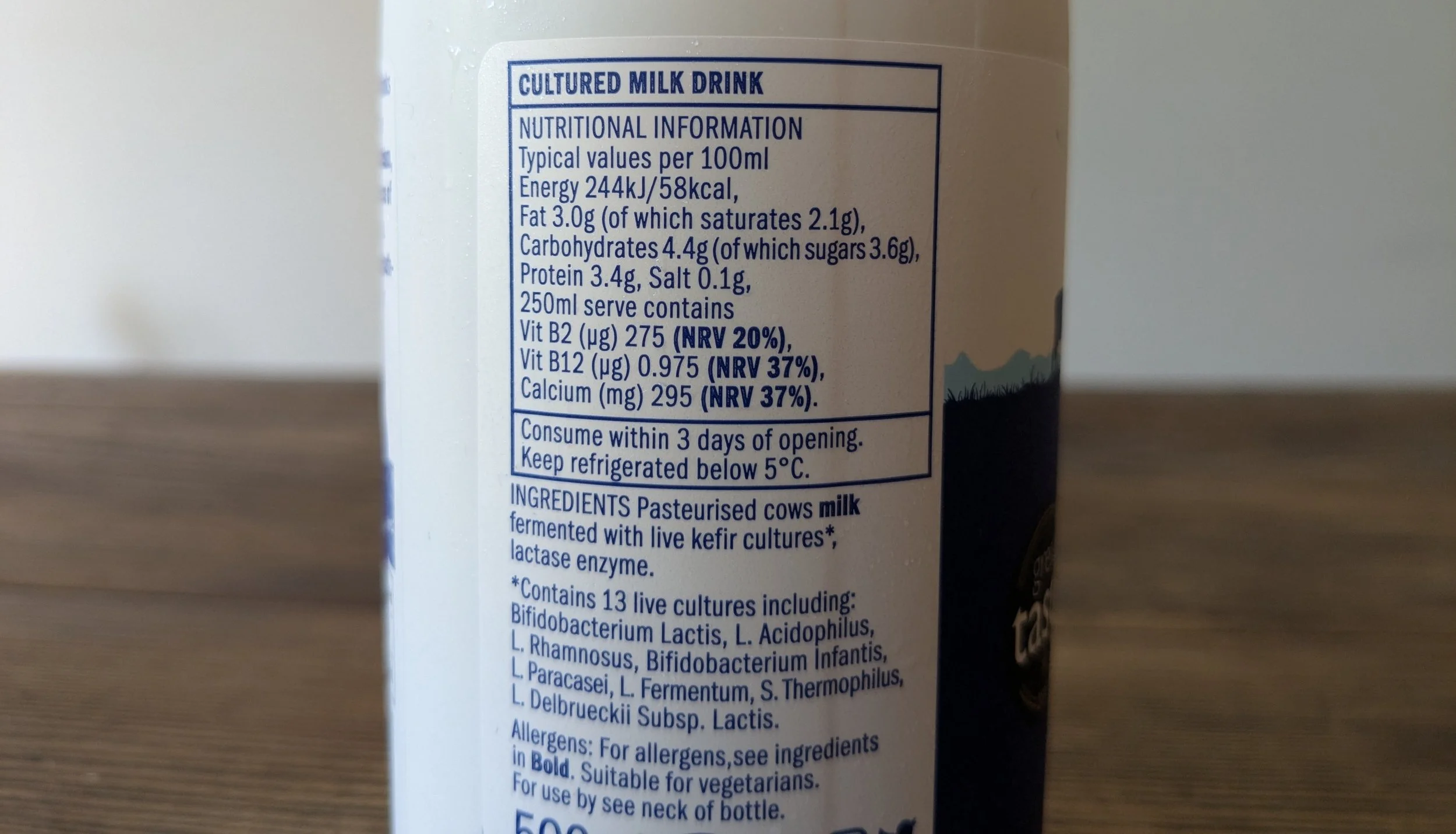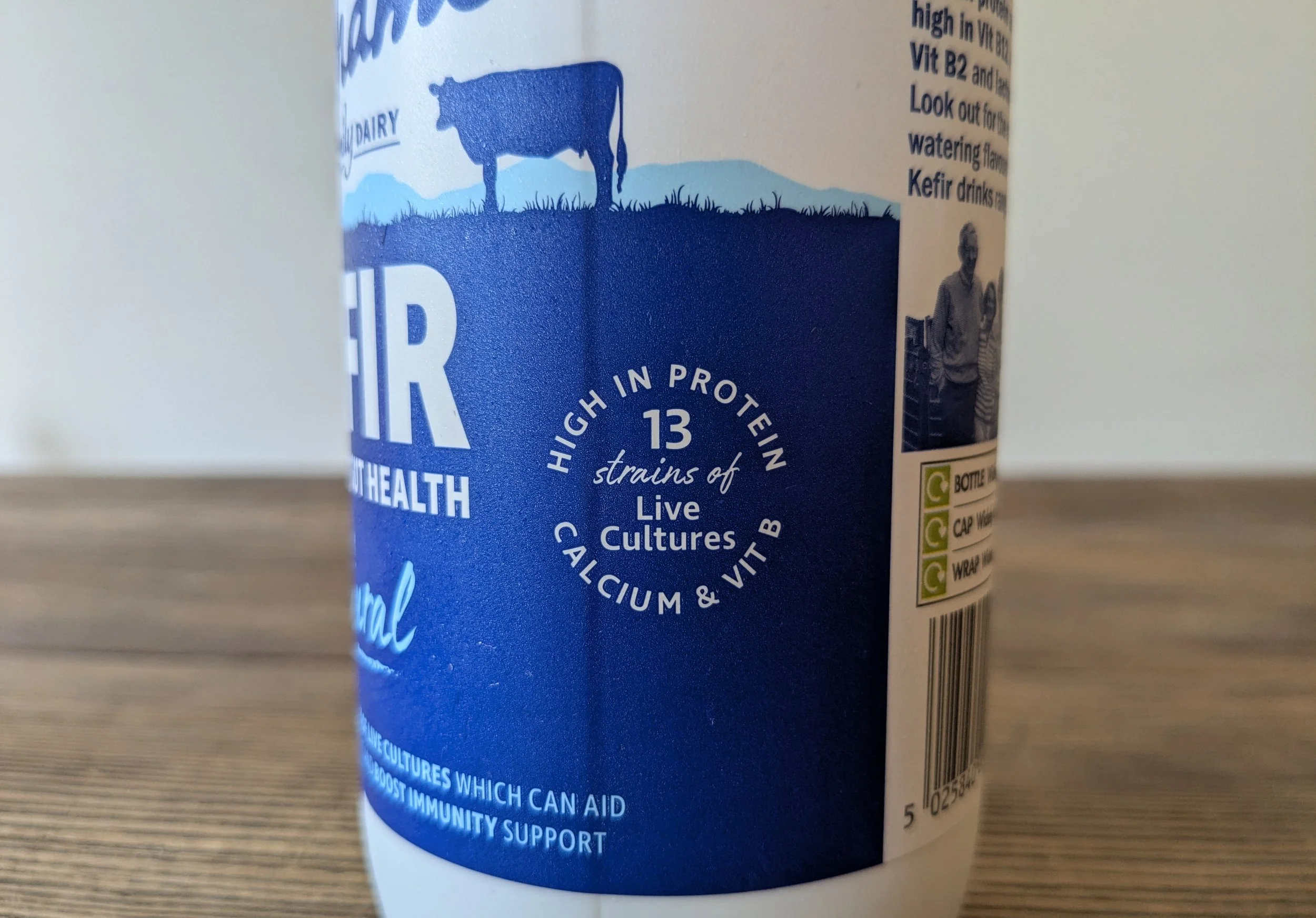Graham's kefir review
Here we will give a hands-on, taste-tested review of Graham's kefir, available in Lidl. We’ll look into the benefits, ingredients, nutrition, use and flavour of this value kefir.
This kefir is available in Lidl supermarkets in the UK and some other food stores too.
Graham's kefir is made in Scotland.
You might also be interested in reading our article on the best probiotics in the UK if you want to add more healthy microbes to your diet.
About kefir
Kefir is a fermented dairy drink which is made by adding kefir grains - which are full of different strains of bacteria and yeast - to milk. (There’s also non-dairy kefir, but we won’t get into that here.)
The result is a tangy dairy drink which is similar to yoghurt but more runny. It also has a lot more bacterial diversity than yoghurt does which makes it better for our gut.
Because of this diversity and increased microbial activity, kefir can sometimes taste a bit more ‘funky’ than yoghurt.
Kefir can be had on its own or you can add it to cereal, smoothies or dressings to increase your probiotic intake.
And because of the strong fermentation of the milk sugars, it is better for people with some degree of lactose intolerance.
Read more about the benefits of kefir and how it differs to yoghurt.
Ingredients of Graham's kefir
This is a fairly simple kefir which only includes milk, live cultures and lactase enzyme.
So it’s basically a traditional kefir with added lactase enzyme.
While all kefirs are reduced in lactose through the fermentation process, Graham’s is able to claim to be lactose free because it has added lactase to further break down the lactose.
In summary, there are no concerning ingredients in this kefir, only healthy things.
Our favourite gut health products in the UK
YourBiology Gut+ probiotic not only offers 10 strains of probiotics, but also includes two types of prebiotics, three digestive enzymes and vitamin D for gut health support. All this means it offers a lot more benefits for gut health and general health than most probiotic supplements do
Healthpath gut health test is the UK’s most comprehensive gut health test. It tests over 100 biomarkers, checks your digestion and immune response, analyses leaky gut and provides a clear and understandable report on your microbiome
YourBiology SuperGreens+ is a superfood and greens supplement which makes it very easy to get a huge amount of nutrition - vitamins, minerals, amino acids, fibre, polyphenols and more - in one glass. Great for supporting gut health, skin health, energy, mental clarity and immunity.
Read more about the best gut health products in the UK.
Benefits of Graham's kefir
This kefir comes with various health benefits related to its live cultures and nutrients, and also from being lactose free. For context, we’ll compare a few key factors against Yeo Valley kefir which is a similar product.
Probiotics
Probiotics are live, beneficial microorganisms that have been proven to support health. They are a specific type of live culture.
Graham's kefir includes 13 strains of live cultures. However, they only list 8 of these strains. Of these strains, 5 are commonly considered probiotic and the other 3 have more limited probiotic evidence.
The well-evidenced probiotic strains are:
Bifidobacterium lactis – Supports digestion, enhances immune response and helps maintain regular bowel movements.
Lactobacillus acidophilus – Aids in lactose digestion, helps maintain balanced intestinal microflora and may support vaginal health.
Lactobacillus rhamnosus – Promotes gut health, supports immune defence and may help reduce the risk of antibiotic-associated diarrhoea.
Bifidobacterium infantis – Contributes to reduced gut inflammation, supports immune balance and may alleviate symptoms of IBS.
Lactobacillus paracasei – Supports immune function, contributes to gut barrier integrity and may reduce allergic responses.
The live cultures with less probiotic evidence are:
Lactobacillus fermentum – Studied for antioxidant and antimicrobial activity; may support gut balance, though evidence is more limited.
Streptococcus thermophilus – Primarily a yoghurt starter culture; helps with lactose digestion and may have some probiotic potential, but evidence is less robust.
Lactobacillus delbrueckii subsp. lactis – Used mainly in yoghurt fermentation; assists in lactose breakdown but is not strongly supported as a probiotic strain.
In comparison, Yeo Valley kefir includes 14 strains of live cultures but doesn’t specify what strains are included so we don’t know how many are probiotic.
In terms of the actual amount of bacteria present (ie colony forming units), unfortunately neither brand gives any information on this.
Learn more about the benefits of probiotics.
Lactose free
A unique selling point of this kefir is that it is not only reduced in lactose like all kefirs are, it is fully lactose free.
Other health measures
Graham's kefir has fairly positive health measures across the board.
Protein: Even though they claim to be high in protein, I’d say their protein content at 3.4% is more at a moderate level. Yeo Valley is higher at 4%.
Sugar: Its sugar content is low to moderate at 3.6%, which is much below Yeo Valley at 5.7%.
Fat: It has moderate fat levels at 3%, which is significantly higher than Yeo Valley (1.9%).
Calcium: Its calcium content is extremely high at 295mg per 100g - which is far higher than Yeo Valley’s decent level of 126mg.
Appearance
As the picture below shows, it appears like a milk with some large bubbles on the surface.
Texture
The texture is a bit lacking and more on the thin, milky side for a kefir. It doesn’t have lumps like some kefir does and you can’t notice much effervescence.
Flavour
The aroma is like yoghurt without any funky vibes kefir can have.
The taste is very clean and simple. It’s like a yoghurty acidic milk. And the acidity makes it quite refreshing.
Overall, the taste is good and certainly very approachable. But my only criticism is that it is a bit one dimensional and doesn’t have the complexity other kefirs have. But I could imagine a lot of people would appreciate this simple, more familiar taste.
Use
Because this kefir is clean, simple and approachable, it could be used in many ways. You could have it on its own or add it to cereal or smoothies. And it could also be used as a dressing.
Cost of Graham's kefir
We bought a 500ml bottle from Lidl for £1.35 - which I think is great value.
Summary
Rating: 4.25 stars out of 5.
Verdict: Graham's kefir is a good value, lactose-free kefir with an approachable taste. Kefir aficionados may find this taste and its texture a bit underwhelming though.
Pros
14 stains of live cultures
excellent calcium levels
lactose free
cheap
approachable taste (if that’s what you’re looking for)…
Cons
…but the taste will be uninspiring to some who are more used to traditional kefir
more information on which live culture strains are included would be good
no information given on the actual amount of live cultures (ie colony forming units)
Other health benefits of kefir
Along with the specific benefits of this kefir mentioned above, kefir in general is good for our health in the following ways.
Vitamins and minerals
Kefir is a source of various vitamins and minerals including:
calcium
B vitamins (B12 and riboflavin)
magnesium
potassium
phosphorous
These vitamins collectively support bone health, energy production, muscle function, immune function and cardiovascular health.
Probiotics
These are the beneficial living microbes you are ingesting when you drink kefir. And kefir in general usually has a lot more different strains of probiotics than yoghurt or kombucha does.
Probiotics offer many health benefits including:
better digestive health
better immune function
reduced inflammation
reduced allergies
better nutrient absorption
Postbiotics
Postbiotics are essentially beneficial things probiotics produce during fermentation. These include healthy short-chain fatty acids which nourish our gut lining and may help reduce symptoms of irritable bowel syndrome.
Reduced lactose
Because of the strong fermentation of milk sugars by a diverse range of bacteria and yeasts, kefir is better for people with some degree of lactose intolerance compared to milk or yoghurt.
Our favourite gut health products in the UK
YourBiology Gut+ probiotic not only offers 10 strains of probiotics, but also includes two types of prebiotics, three digestive enzymes and vitamin D for gut health support. All this means it offers a lot more benefits for gut health and general health than most probiotic supplements do
Healthpath gut health test is the UK’s most comprehensive gut health test. It tests over 100 biomarkers, checks your digestion and immune response, analyses leaky gut and provides a clear and understandable report on your microbiome
YourBiology SuperGreens+ is a superfood and greens supplement which makes it very easy to get a huge amount of nutrition - vitamins, minerals, amino acids, fibre, polyphenols and more - in one glass. Great for supporting gut health, skin health, energy, mental clarity and immunity.
Read more about the best gut health products in the UK.
Your reviewer
This hands-on review was written by Travis, the founder of this website, long-time gut-health enthusiast, science nerd and passionate kombucha maker of over 10 years!








